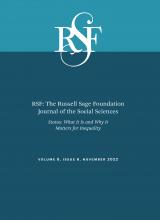Abstract
Although social status has been shown to be a fundamental motive for individuals, theories of development have largely overlooked the role of status in shaping economic and social outcomes. In tracing the historical roots of social hierarchy through the cases of race, colonialism, and caste, this article outlines the specific mechanisms through which status inequality exacerbates economic disparity between groups and challenges redistributive politics. Whereas mainstream scholarship on identity has focused on cultural representation, I argue that status is fundamentally tied to economic systems and connects cultural injustice to economic exploitation. I propose that representation of low-status groups in public institutions can reduce the real and imagined social distance between groups, which can in turn have positive implications for redistributive politics.
- © 2022 Russell Sage Foundation. Chakrabarti, Poulomi. 2022. “Status and Development: How Social Hierarchy Undermines Well-Being.” RSF: The Russell Sage Foundation Journal of the Social Sciences 8(6): 28–49. DOI: 10.7758/RSF.2022.8.6.02. I am thankful to Cecilia Ridgeway, Hazel Markus, and three anonymous reviewers for helpful suggestions. I also benefited from feedback from the participants of the Russell Sage Foundation conference organized in preparation for this special issue, and the Political Philosophy Reading Group at Queen’s University. I am grateful to Ben Hines and Jessica Curry for their permission to use Parker’s photograph. Direct correspondence to: Poulomi Chakrabarti, at pchakrabarti{at}fas.harvard.edu, 1737 Cambridge Street, Cambridge, MA, 02138, United States.
Open Access Policy: RSF: The Russell Sage Foundation Journal of the Social Sciences is an open access journal. This article is published under a Creative Commons Attribution-NonCommercial-NoDerivs 3.0 Unported License.






